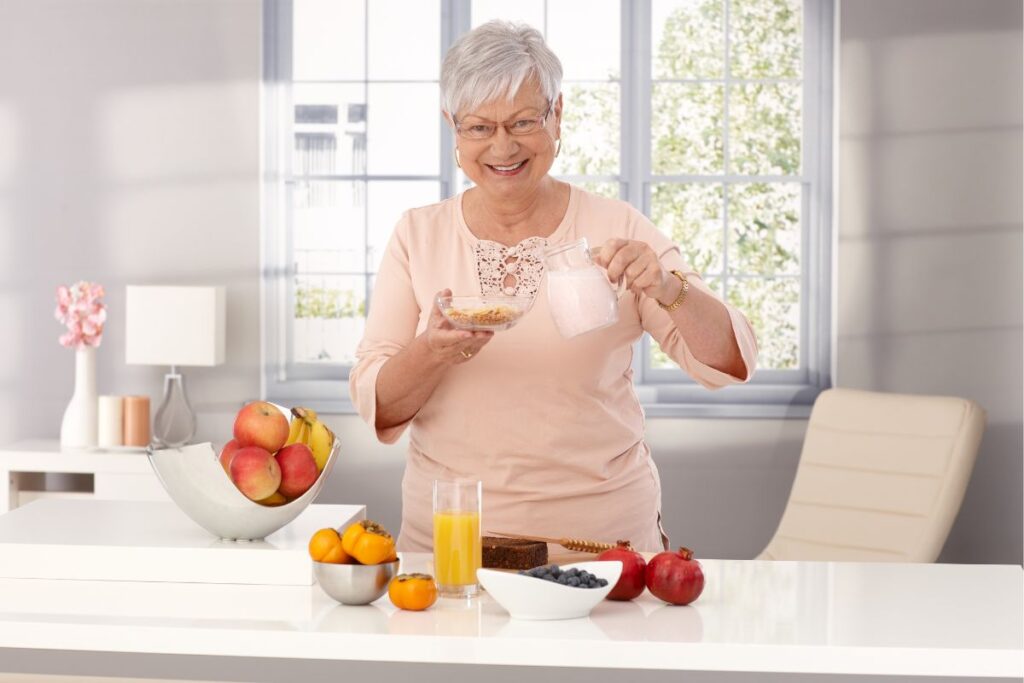People’s dietary requirements change as they age. Older people need special attention in diet to maintain their health. As they deal with chronic illnesses, bone loss, and muscular atrophy (sarcopenia), they need to eat a diet high in nutrients. To promote healthy ageing, Guideline 16 of the 2024 Dietary Guidelines for Indians addresses the significance of consuming a balanced combination of proteins, calcium, antioxidants, and micronutrients.
This article explores the key dietary recommendations for older people and practical strategies to maintain their health and wellness.
Why Nutrient-Rich Foods Are Crucial for the Elderly
As people age, physiological changes such as reduced muscle mass, slower metabolism, and decreased absorption of nutrients increase the risk of health issues like:
● Sarcopenia: Loss of muscle mass and strength.
● Osteoporosis: Reduced bone density and increased fracture risk.
● Degenerative Diseases: cognitive decline, cardiovascular issues, and diabetes.
Nutrient-rich foods help:
- In bone health and muscular mass.
- Support brain function and reduce oxidative stress.
- Boost immunity and slow the progression of degenerative diseases.
Key Nutritional Recommendations for the Elderly
1. Protein-Rich Foods
Proteins are very important for repairing tissues, maintaining muscle mass, and boosting immunity.
● Sources: Milk, curd, pulses, nuts, eggs, fish, and lean meats.
● Tip: Include at least one high-protein food in every meal.
Key Nutritional Recommendations for the Elderly
1. Protein-Rich Foods
Proteins are needed for repairing tissues, maintaining muscle mass, and boosting immunity.
● Sources: Milk, curd, pulses, nuts, eggs, fish, and lean meats.
● Tip: Include at least one high-protein food in every meal.
2. Calcium for Bone Health
Adequate calcium intake prevents osteoporosis and supports strong bones.
● Sources: Milk, curd, ragi, sesame seeds, and green leafy vegetables like spinach and amaranth.
● Tip: Pair calcium-rich foods with vitamin D exposure for better absorption.
3. Micronutrients and Antioxidants
They offer a defence against degenerative illnesses and oxidative stress.
● Sources:
● Fruits: Oranges, apples, bananas.
● Vegetables: Broccoli, carrots, and leafy greens.
● Nuts and Seeds: Almonds, walnuts, chia seeds.
4. Adequate Hydration
Older adults often experience dehydration because their thirst awareness is weakened.
● Recommendation: Drink 8–10 glasses of water daily. To increase fluid intake, include soups, herbal teas, and fruits like watermelon.
5. Healthy Fats
Incorporate good fats like omega-3 fatty acids to support brain health and reduce inflammation.
● Sources: Fatty fish, flaxseeds, and walnuts.
Lifestyle Recommendations
1. Regular Physical Activity
● Engage in light exercises like walking, yoga, or strength training to maintain muscle mass and bone density.
● Aim for 30 minutes of activity daily.
2. Sunlight Exposure
● Spend 20–30 minutes outdoors between 11:00 am and 2:00 pm for adequate vitamin D synthesis, crucial for calcium absorption.
3. Avoid HFSS and Ultra-Processed Foods (UPFs)
● Minimise foods high in salt, sugar, and unhealthy fats, which contribute to chronic diseases like hypertension and diabetes.
Sample Daily Diet Plan for the Elderly
Morning
● A glass of milk with ragi porridge or multigrain bread.
Mid-Morning Snack
● A handful of nuts (almonds, walnuts) and seasonal fruits.
Lunch
● Brown rice or chapatis, dal or fish curry, a vegetable salad, and curd.
Evening Snack
● A bowl of sprouts or boiled chickpeas with lemon.
Dinner
● Whole-grain chapatis, paneer or chicken curry, steamed vegetables, and fruit.
Myths About Nutrition for the Elderly
Myth 1: “The elderly need fewer nutrients.”
● Fact: Aging increases the need for certain nutrients like protein, calcium, and vitamins to counter muscle and bone loss.
Myth 2: “Dairy is harmful to the elderly.”
● Fact: Dairy is an excellent source of calcium and protein. Those with lactose intolerance can opt for curd or fortified alternatives.
Myth 3: “Supplements can replace a balanced diet.”
● Fact: Whole foods are still the best providers of nutrients; supplements are just an option to fill in any gaps that one may have.
Myth 4: “Older people don’t need exercise.”
● Fact: Regular exercise is essential for maintaining strength, mobility, and general health.
Myth 5: “Salt and sugar restrictions mean bland food.”
● Fact: To enhance flavour without relying on salt or sugar, use herbs, spices, and natural sweeteners like honey.
FAQs About Nutrition for the Elderly:
How much protein should the elderly consume daily?
Elderly individuals should aim for 1–1.2 g of protein per kilogram of body weight.
What are good sources of calcium for the elderly?
Milk, curd, ragi, sesame seeds, and leafy greens like spinach and amaranth are excellent options.
Why is hydration important for the elderly?
Dehydration can cause fatigue, confusion, and urinary tract infections. Ensure adequate fluid intake throughout the day.
Can the elderly follow vegetarian diets?
Yes, but include protein-rich vegetarian sources like pulses, soy products, and nuts to meet nutritional needs.
Is it safe for the elderly to take supplements?
Supplements should only be taken under medical guidance to address specific deficiencies.
How HealthPil Can Help:
At HealthPil, we prioritise the well-being of the elderly by offering:
● Customised Nutrition Plans: Tailored diets to meet individual needs.
● Lifestyle Guidance: Advice on physical activity and vitamin D optimisation.
● Expert Consultations: Professional support to manage age-related health challenges like osteoporosis and sarcopenia.
Disclaimer
This article is for informational purposes only and should not replace professional medical advice. Consult a healthcare provider for personalised recommendations.
Conclusion
Good nutrition is the foundation of healthy ageing. By incorporating nutrient-rich foods, staying hydrated, and leading an active lifestyle, the elderly can maintain their health and enjoy a better quality of life. Trust HealthPil to guide you or your loved ones toward sustainable, evidence-based health solutions for ageing gracefully.

